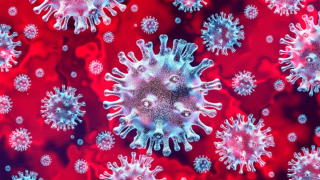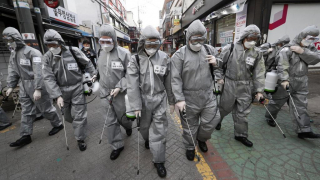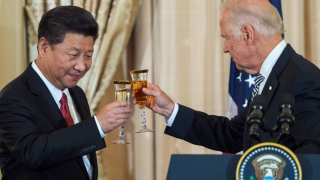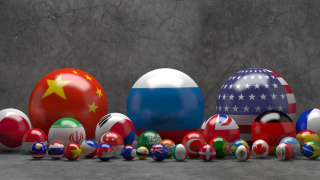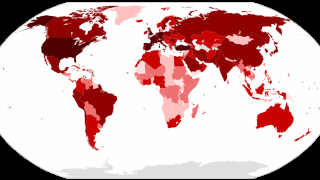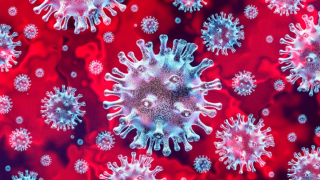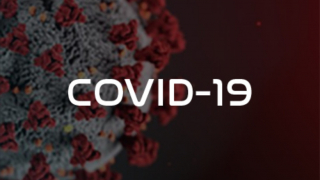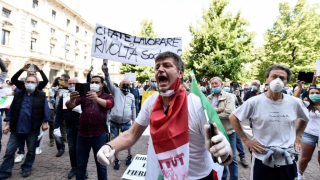Skinner's cage: addicted on the restrictions
In Pavlov's dog experiment, the scientist distributed food after the bell rang. After a certain number of tests, he noticed that not only was the animal happily rushing to the bowl at the sound of the bell, but it began to salivate, anticipating the meal, already at the moment of the ring. Pavlov had demonstrated the existence of “conditioned” reflexes, that is, determined by a provoked external event, the so-called “reinforcement”. Pavlov had created an addiction in the animal, activated by the ringing of the bell, the announcement of the meal. Natural reflexes, properly stimulated, had provoked an emotional response. After him, Burrhus Skinner invented the “operant conditioning”. He built a cage in which the guinea pig could explore the environment and perform acts such as pressing a lever or pressing a button. Some of the animal's behaviors were “reinforced”, which made it more likely the re-presentation of the behavior desired by the researcher. If the guinea pig discovered that pressing a button led to the delivery of food, it would repeat it several times. Operant conditioning allows us to induce behaviors that, if reinforced, produce learning and repetition.
We fear that power has used similar criteria - strengthened by studies following the discoveries of Pavlov and Skinner - to build not only the official “narrative” on Covid 19, but to first accept, then introject and make permanent, the fears and above all the wanted behaviors. In simple words, we have become addicted on the restrictions and attitudes of life imposed through a campaign of a breadth, pervasiveness and continuity never experienced before. We have introjected physical distancing, defined as “social”, mutual distrust - homo homini virus - even shunned the handshake with friends and relatives and we got used to existential loneliness, all the more sad in the face of suffering, illness, death.
Fear, largely induced, has won. Skinner's cage works great: we voluntarily close it and hand over the keys. The majority respond automatically to stimuli activated by power. The proof is the persistence of the use of the mask in open spaces, despite the fact that the imposition has dropped. The most striking case is the reaction of the majority of Britons to the abolition of most of the Covid restrictions starting on July 19. Her Majesty's subjects have a very high percentage of vaccinated people and the government of Boris Johnson has always spoken frankly to the country: few lies, the admission of the problem, measures that are, after all in, proportionate to the health dimension. To support the end of the prohibitions, Johnson appealed to freedom, the recovery of sovereignty and responsibility to the people, concepts that in Britain, the cradle of liberalism, should have been greeted with widespread relief and consensus.
On the contrary, the British responded with hostility, almost with horror. The population appears to be in favor of the suppression of concrete freedoms and individual rights. A poll found that not only the majority is in favor of the restrictions, but many think they should be kept forever. The English way of thinking is widespread in Italy and elsewhere, a phenomenon to be analyzed under multiple psychological, sociological, anthropological aspects. Dystopias quickly become reality: two out of three British people are in favor of the mask even at the end of the emergency and a disturbing thirty percent approve the curfew indefinitely.
Before expressing a judgment, a minimum of reconstruction of the events that have taken place since February / March 2020 is required, when the governments, with worrying, suspicious harmony, have decided (or have accepted the will of the higher levels of terror to accept confinement, renamed lockdown. It was a question of emphasizing the risks of the unknown disease, extending them to the entire population, not just to the most vulnerable age groups and categories. It was the time of the dramatic images of Bergamo, of mass graves, of mass intubated people, the reason, as we later understood, of countless mourning. The message justified, indeed imposed mass imprisonment and the blocking of economic activities.
There is no hint of selective protection of risk groups, but the means is the message: fear makes you really scared. The appeal to terror - producd in part by the absolute materialism of the terminal West and the removal of death, the great taboo - has unleashed a snowball effect completely unexpected by observers, but probably predicted by power. Amplified by all the media, reinforced by the din of the masses and the unknown origin of the evil - the official version spoke of a disease brought by bats, repulsive animals hated by the popular imagination - the alarm led to generalized panic. There is no historical record of an equally powerful global campaign capable of generating such lasting fear. Once the state of panic settled, an unhealthy interaction was established between governments and the population. In some cases, like Great Britain of the “freedom day”, it was public opinion that asked for more restrictions, in others - like Italy - the spiral of fear was ridden by the power system, convinced that the pot needed more pressure to achieve a higher percentage of injections once Big Pharma preparations are on the market.
The use of fear to discourage certain behaviors is certainly not new, but it is the first time, we believe, that it has been used to deal with a disaster. On the contrary, governments have always tried to spread soothing messages to prevent panic from taking hold of the population.
However, in times of cancel-culture, the examination of the precedents is of no interest at all: antiquities from dark times, not illuminated by Science and Progress. It seems that the world was born at the dawn of the Third Millennium, former Christian, and that the entire past must be obliterated, ignored, condemned for impiety. Or - thinking the worst of someone is a sin, but usually you are spot on - creating a permanent state of anguish was from the beginning a goal of the upper level of power, of which national governments are the well-paid laborers.
So, a walk with the family, a coffee at the bar, uncovering the face, has suddenly become illegal, a crime pursued fiercely by the thugs of the power, abhorred by the fearful informers of any behavior advised against by the kick drum of communication. Instead of explaining that history has known a succession of epidemics, almost all more serious than the present one, power has acted as if the situation were unprecedented, an Apocalypse to which the strangest, most unusual, contradictory measures are applied.
The Sars-Cov 2 has seen almost more policemen engaged than health professionals. The unusual zeal of many categories was reminiscent of a sharp aphorism by George Bernard Shaw: when a fool does something he is ashamed of, he says it is his duty do it.
Fear is a useful response because it protects against many dangers, but it becomes harmful when it is irrepressible, persistent, paralyzing. Fear - which has become another virus - promotes the abuse of alcohol, drugs, psychotropic drugs, induces anxiety and depression, causes destructive and self-destructive impulses. In addition, it weakens the immune system, the first bastion in defense of the body. Fear inhibits action, makes you dependent, blocks rational judgment, transforms even the freest personality into a slave. Over time, humanity has devised various mental mechanisms to mitigate fear, all defeated by a pounding propaganda action, which cannot escape any daily gesture. Think of a bus ride, during which after each stop the litany of the distance to be observed - almost impossible - of the mask to be worn right under the eyes is punctuated by the speakers, with the threatening corollary of sanctions.
All this has transformed the neighbor into an enemy, the Other into an infector, a vehicle of disease and death. The truly violent declarations of a wise man like Mario Draghi go in this direction: if you don't get vaccinated, you get infected and become a killer yourself. It goes without saying that the killer is a criminal to be brought to justice, with the active collaboration of good citizens. No imprudence on the part of Mister Britannia [1]: he said exactly what he wanted to say.
An effective way to escape fear in other situations is to meet the demands of propaganda: to stop smoking or taking alcohol.
With Covid, the operation is impossible: even respecting every rule, the danger remains. Hence the transformation of fear - reasonable, to be faced with prudence - into terror, by nature uncontrollable.
The succession of messages is devastating: “it is essential to adopt this measure and accept the relative restriction”, but, immediately after acknowledgment, “we are as vulnerable as before”. The result is the perception of absolute precariousness, a feeling that fosters a sense of learned helplessness, an antechamber of dependence on restrictive measures. Some are calling for an extra ban in an attempt to temporarily relieve anxiety, but, as with any addiction, increasingly higher doses of restrictions are needed to achieve a temporary decrease in fear. Active conditioning makes Skinner's cage tighter and more tortuous the road to freedom.
Spreading fear is an irresponsible policy, especially during an epidemic. The duration of the panic leads to severe, long-lasting social and behavioral consequences. It causes mental disorders, increases selfishness and intolerance, eliminates respect for the rights of others, endangers freedom, transforms constitutional rights into waste paper, since a terrified majority hysterically supports the suppression of all freedom in the name of hope - only hope - of personal existence in life. In Italy, moreover, the regulatory fluctuations, the cold shower of openings and closings, the macabre dance of prohibitions and "concessions", feed the vicious circle of insecurity.
The virus - almost everyone has understood - will not disappear by decree, due to the accumulation of bans or even due to the favorable outcome of health immunization campaigns. Past mankind learned to live with far more dangerous pathogens. But already, yesterday does not count and it is difficult to return to the awareness that there is no zero risk (we have been convinced of the technoscientific omnipotence of post-modern homo deus) and that multiple diseases kill every day, perhaps more than before, since therapies are focus on a single pathology.
We are at a crossroads: recover freedom and a minimum of rationality, or lose both for a long time. It seems that this is the goal of power, with the broad consensus of the subjects.
No one has ever heeded Etienne de la Boétie's warning: the tyrant, individual or collective, keeps his grip as long as his subjects give it to him. In the present condition, the Stockholm syndrome prevails, that is, sympathy for the tyrant, while any dissident act, idea, speech or thought is surrounded by contempt. The demonization of the enemy designated from time to time acts effectively: the denier (but the removal of a real danger is a well-known psychological mechanism), the opponent of salvific injections, the simple man in the street who does not believe in the official narrative.
Unfortunately, an exclusively material, heavy, zoological sense of existence spreads: meal, shelter, sleep, another meal, administered by the “good” shepherd. An unconscious existence, especially of the fact that the shepherd, the flock and the guard dog do not love the flock: they limit themselves to protecting it up to the slaughterhouse. If this is the post-humanity to which they are reducing us, the anti-speciesists (who support the equivalence between man and other living beings ) are right; they are truly transforming us into Desmond Morris' “Naked Monkey, zoological study on human animal”.
However, the reflexes are not completely conditioned: not all Skinner's cages are sealed, not all reflexes are those of Pavlov's dog. This was demonstrated by the unexpected success, exceeding any prediction, of the more than eighty demonstrations on Saturday 24 July against the “passaporto verde” (we do not say “green pass” out of respect for our language, a powerful sign of the identity of a people that cannot be reduced to population, human herd). The verbal violence, the manipulation of the regime and its journalistic, cultural and political minions made themselves felt, but did not discourage the participants. Someone asked if the relevant permits had been requested. No, when the people move, they do not need the authorization of their superiors and can well assert the natural (and constitutional) right to assemble peacefully and without weapons.
Yet, scattered cries were heard from above, the unbalanced “no vax”, the anarchist, the extremist, preferably on the right, were sought with fervor. They tried unsuccessfully to minimize the numbers: the squares shrink or widen according to the flags of the demonstrators. They persisted with the grotesque question of distances, which did not outrage the commentators of the celebrations for the national football team. No triumphalism: it can only be a flash in the pan.
But perhaps a breeze finally blows against power - political, health, scientific, economic, media - whose scope will become clear over time. And it is a breeze of freedom, not of fear, prohibition, ban. A certificate of existence in life of a minority, but not negligible number of Italians who, for one thing, respect the rules, but do not consider the mask a panacea. The symbol of Sars-Cov 2 is rather the new transitional object, Linus' blanket of the disease, the cheap chamomile, the symbol of tics, fears, obsessions and now also a fashionable accessory. The whole world-market shreds everything, reduces everything to a price tag: “I want the mask that I like so much, that distinguishes me in the crowd of hidden men and women, relieves fear, gives me a special place in the flock of differently alike.”
Some hope resurfaces: those who believed for a year and a half to be, like John the Baptist, the “voice of those who cry out in the desert” now know they have had listeners. The first way to deal with a problem - stolen freedom - is to acknowledge that it exists. The second is not to treat it with the methods of the past, that is, not to believe in the mediation of politics, in the thaumaturgical power of a domesticated and often sold “civil society” and, with calm firmness, act personally, proving to be there and to constitute a force. Good ideas - if we really believe in the one that contains them all, freedom - will come. We love ideas that become actions.
[1] Italian Prime Minister in-office Mario Draghi joined a meeting on the “Britannia” in 1992, together with other people, to discuss about the future of Italy among other things.
***************************************************
Original column by Roberto Pecchioli:
https://www.maurizioblondet.it/la-gabbia-di-skinner-dipendenti-dalle-restrizioni/
Translation by Costantino Ceoldo


